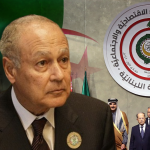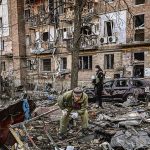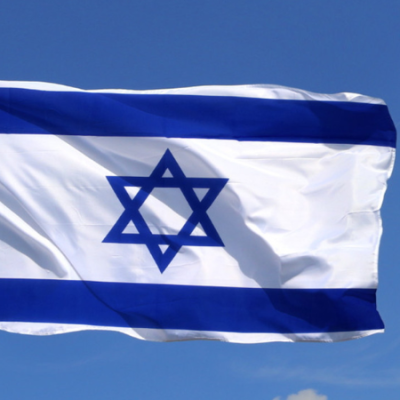Consumers concerned about increasing prices ahead of Ramadan 2022 said “no one is thinking about Covid in the meanwhile “

 Iraq–The Covid-19 outbreak has disrupted Ramadan for millions of Muslims around the world over the last two years. People across the Middle East, however, say they are more concerned this year as a result of regional crises and price increases. “No one is thinking about Covid during Ramadan,” said Ahmed El Gizawy, a construction worker in Cairo,. “The growing prices in the United States are on everyone’s thoughts. Even bread has become too pricey. Many individuals, including myself, are suffering greatly as a result of this stress.”
Iraq–The Covid-19 outbreak has disrupted Ramadan for millions of Muslims around the world over the last two years. People across the Middle East, however, say they are more concerned this year as a result of regional crises and price increases. “No one is thinking about Covid during Ramadan,” said Ahmed El Gizawy, a construction worker in Cairo,. “The growing prices in the United States are on everyone’s thoughts. Even bread has become too pricey. Many individuals, including myself, are suffering greatly as a result of this stress.”
Ahmed Ali, a government employee in Baghdad, Iraq, exited from a hypermarket with one little plastic bag. “All costs are up, and Ramadan is only a few weeks away,” the government employee explained. Prices are soaring due to the conflict in Ukraine and cash shortages. Prices of essential items, particularly those manufactured with wheat or oil, have risen as a result of the conflict in Ukraine.
In light of the Russia-Ukraine conflict, the price of bread in Egypt has risen by up to 50%. The biggest loaves will cost around 1.5 Egyptian pounds this Ramadan, up from 1-pound last year. “Many Egyptians, especially the poorer classes, have since forgotten about Covid-19. I believe they began to treat it as if it were God’s will, and they went on with their lives. It was only a major issue for folks who couldn’t work or feed their families during the closure.”
Related Posts
Mr El Gizawy said that increased fuel prices had caused many development projects to be postponed. He’d been at home, waiting for the construction site where he works to reopen, with coworkers contacting him frequently, fearful of losing their jobs. 14 litres of cooking oil in Jordan has risen from $24 to $32 in the last month. The price of a 10-kilogram bag of rice increased from $3 to $15.
Lina, a Jordanian mother of two, said her extended family had been stocking up on rice, pork, sugar, and oil, as well as cooking gas cylinders. “This is the first Ramadan since Covid that families can dine together,” she added, adding that individuals are purchasing more. Iraq will run a budget deficit by the end of 2020 as a result of recent currency depreciation due to a major drop in oil earnings. As a result of this, as well as the crisis in Ukraine, the price of some food goods has risen by as much as 50%. “The rising prices have disproportionately impacted individuals with limited income and the middle class, while the wealthy are unaffected,” Ahmed Ali, 30, said.
Since the Iraqi dinar plummeted by around 23 percent against the dollar in late 2020, public outrage has grown. Iraq imports the majority of its goods, both food and non-food. Mr Ali remarked, “We’ve felt the squeeze.” “I anticipate that it will have a 30% impact on my budget, and that will be reflected in what I buy.” Lebanon is preparing for the worst Ramadan it has seen in decades.
Lebanon is one of the few countries in the area that is in such dire straits. It is afflicted by the difficulties that have afflicted other countries, as well as the effects of years of economic collapse. According to the Crisis Observatory Unit of the American University of Beirut, the average cumulative monthly cost of iftar for a family of five in Ramadan 2021 was two and a half times the country’s monthly minimum salary. “The most basic things we can cook for Ramadan this year would be insanely costly,” one office manager, Sawsan Ramadan, said. “For many people, even hosting or attending festivities this month will be a financial strain.”
According to the United Nations, about 80% of Lebanon’s population is poor. Since October 2019, the Lebanese lira has lost more than 90% of its value, making basic necessities unaffordable for many. Families are finding it difficult to stay warm due to a raging storm and energy shortages, while expensive gasoline prices have made transportation a luxury. “When it comes to food and iftar preparations, this year is extremely expensive and unaffordable.” “I simply cannot imagine of enjoying a joyous season for Ramadan while people are dying of starvation,” Aida Fakhoury, a clinical quality specialist, told The National. Governments take steps to assuage citizens’ fears.
Despite rising unemployment and a stagnating economy, Jordanian officials have assured that the country is fully provisioned with essential supplies. Despite the lifting of coronavirus restrictions, a Syrian owner of a big restaurant in Amman with a middle-class clientele said he did not expect much increase in business this Ramadan because business had been weak for the previous nine months. “The economy is in a funk, and people aren’t spending except on necessities,” he explained. For the next two months, the Iraqi government has halted customs charges on food, essential consumer items, and building supplies. It has announced that government workers and retirees with an annual salary of less than one million dinars (about $700) will get a monthly stipend of roughly $70.
Last week, the Iraqi Trade Ministry said that as part of its subsidy scheme, it was providing seven-item Ramadan food baskets. Rice, sugar, cooking oil, tomato paste, beans, lentils, and chickpeas are all included in each hamper. During the holy month, they will be distributed three times. Egypt launched a multibillion-pound relief plan this week, which includes tax rebates, pay increases, and pensions, as well as a broader state assistance program for disadvantaged families. The Egyptian government has also established a 130 billion Egyptian pound special fund to counteract the consequences of the Ukraine conflict on the Egyptian economy.
Omar Ibrahim, 37, an antique store seller, believes that Covid-19 poses no threat to Ramadan customs in Egypt’s capital, Cairo. Egypt’s daily coronavirus cases have been declining since reaching an all-time high of 2,301 infections in early February. The health ministry of the country recently declared that Covid-19 updates will be lowered from daily to weekly. “This year’s Ramadan is a little different for me. “It’s right around the corner, but there isn’t the typical buzz since everyone’s attention is focused on Russia’s war with Ukraine and how it’s driving up costs here,” Mr Ibrahim explained.













